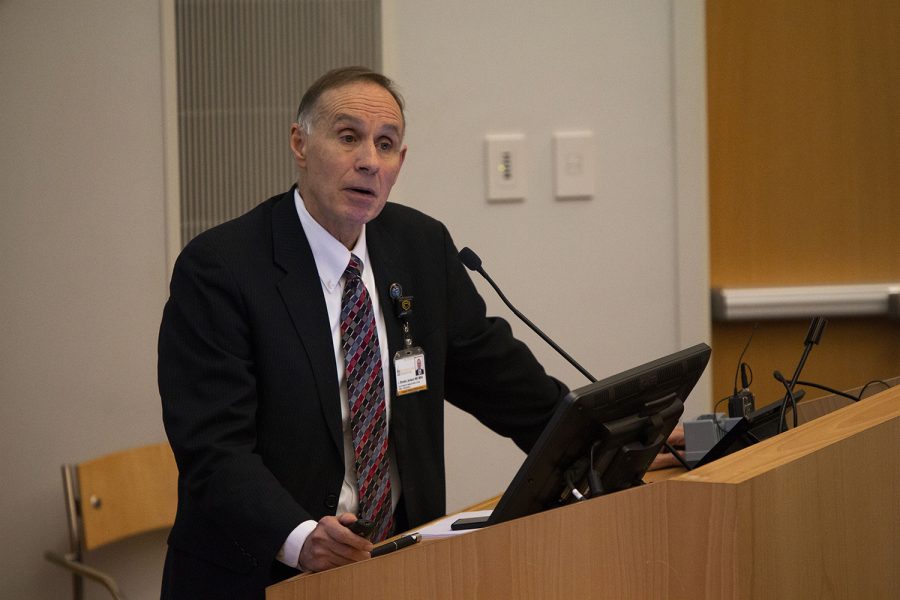Guest Opinion | Brooks Jackson: Progress in the prevention and treatment of COVID-19
University of Iowa Vice President for Medical Affairs Brooks Jackson writes on quick advances UI Health Care has made in treating and preventing COVID-19
Brooks Jackson, MD, MBA, University of Iowa vice president for medical affairs and dean of the UI Carver College of Medicine, speaks to attendees during “State of the Enterprise: Strengths, Challenges, and the Path Forward” at the Medical Education and Research Facility on Wednesday, Nov. 28, 2018. Jackson provided an overview of UI health care research.
December 30, 2020
Although the COVID-19 pandemic has come at a steep cost in terms of infections and lives lost, there has been tremendous progress in the diagnosis, prevention and treatment of this new lethal virus.
In a matter of days after a national emergency was declared concerning the COVID-19 outbreak, University of Iowa Health Care had the capability of diagnosing COVID-19 by the most sensitive PCR methods. Our health system provided seven-days-a-week access to testing through the local influenza-like-illness clinics that delivered results within six hours on average – one of the very best turnaround times in the country.
UI Health Care quickly implemented safe practices of social distancing, hand washing, wearing of personal protective equipment (PPE), limited visitor policies, remote working, and temperature screening to minimize transmission in the health care setting.
We also instituted a home treatment team which allows health care providers to follow higher risk infected patients at home to monitor progression and prevent hospitalization. This successful care model has resulted in very low mortality rates of 5 of 1300 (0.4 percent) and has been replicated by other health systems throughout the state.
In addition, we launched one of the earliest COVID-19 convalescent plasma treatment programs and in the spring led early adoption of the antiviral drug Remdesivir and the steroid dexamethasone for inpatients.
More recently, UI Health Care began offering the monoclonal antibody infusion therapies, Regeneron Casirivimab and Imdevimab and Eli Lilly Bamlanivimab, to prevent hospitalization in high risk outpatients currently infected with COVID-19. As of Dec. 30, we have infused over 220 recently diagnosed COVID-19 outpatients with very few post-infusion admissions. This suggests that these treatments work, especially when patients get tested as soon as symptoms appear and then schedule an appointment for an infusion within 24 hours.
UI Health Care researchers have also played an important role locally and at the national level conducting landmark research in understanding the pathogenesis of COVID-19 infection and evaluating new treatments. UI Health Care also participated in the Pfizer-BioNTech randomized double blind COVID-19 vaccine trial starting in July and enrolling 270 subjects. Within two days of the FDA’s emergency use authorization of the Pfizer-BioNTech vaccine, which has a 95 percent efficacy rate in preventing COVID-19, we started vaccinating our health care workers. We are prepared to vaccinate more than 18,000 employees by the end of January, contingent on the amount of vaccine we receive over the coming weeks, including the recently authorized Moderna vaccine. We are proud of the role we played in this historic clinical trial, and we are in the process now of starting a new trial for yet another vaccine candidate.
Although COVID-19 has caused over 11,000 infections and 47 deaths in Johnson County since the start of the pandemic, the number of COVID-19 positive cases has dropped to 40-50 per day since the peak of 222 per day on Nov. 5, and the number of inpatients with COVID-19 has decreased from a high of 100 to less than 50 as of December 30. We are beginning to see the light at the end of tunnel. It’s possible we’ll be able to vaccinate most people at high risk for hospitalization and death in Johnson County by February/March, provided there is enough vaccine, and if this occurs, I believe serious COVID-19 disease will drop to very low levels. With continued vaccinations and safe practices, we could also see very low infection rates by summer or earlier.
All of this impressive progress could not have been done without the dedication, persistence, innovation, and long hours contributed by thousands of UI Health Care and University of Iowa faculty, students, and staff. Many of us have taken significant health risks and have been here in person onsite 6-7 days a week since March to deliver the best preventive and treatment interventions, as well as to advance the scientific discoveries to benefit the people of Johnson County, the region, and the state. I would also like to acknowledge and thank Johnson County Public Health, the Iowa Department of Public Health, the Iowa City City Council, and Gov. Kim Reynolds’ Office for supporting UI Health Care through these challenging times.
We still need to be cautious in our practices as the pandemic is not yet over, but I am becoming very optimistic that the worst is behind us and that we can look forward to a much better 2021.
— Brooks Jackson MD MBA, dean Carver College of Medicine, and vice president for medical affairs UI Health Care



